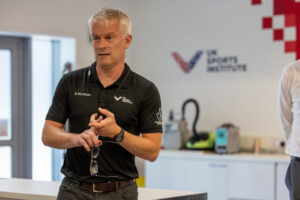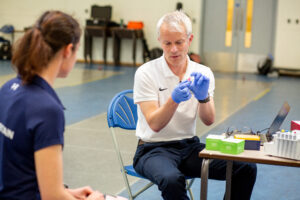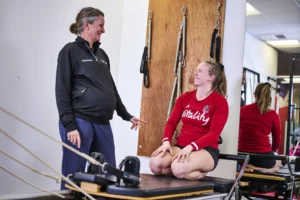Dr Richard Burden: ‘Taking collective ownership’ key to driving Female Athlete Health and Performance forward
I was recently invited to speak at a two-day event, organised by Leaders: ‘Driving Step-Change in Female High Performance’. It was the perfect opportunity to reflect on what we’re currently doing to support female athletes at the UK Sports Institute and also find out more about what our counterparts across sport are doing in this space. It is absolutely vital that we make these connections across sports and across industries if we want to drive real change. Meeting new people, collaborating and sharing ideas is one of the best ways we can do that.

Through my update, I covered the evolution of our Female Athlete Health and Performance programme, as well as sharing some of the initiatives that we run, including the pre-Tokyo bra project, where over 100 athletes received a professional fitting and education service, as well as properly fitting sports bras for competition. I also discussed Hormonix, the technology that enables non-invasive hormone monitoring, which we have been using across sports to better understand the association between the menstrual cycle and performance. Another project I talked through was our Nationwide Pathology partnership, which has established centralised blood screening services across our system, allowing our Female Athlete and Performance Data Teams to work together to centralise system-wide data and develop insights to better understand various aspects of female athlete health. I wanted to show the audience the potential of what we can do when we work together and harness information from right across the high-performance system.

The second half of my talk focused on our approach to the future and what that might look like, with the main crux centring on collaboration. I talked about our growing partnership with Manchester Metropolitan University’s (MMU) Institute of Sport and how that is a way of reducing barriers in research and innovation by bringing academia and researchers closer to the field of play and the athlete and coaches environments. By working in this way, we can work directly with sports and athletes to provide meaningful research that is co-designed and everyone feels part of the journey. We currently have a PHD student with MMU embedded within a British Rowing project, which is a perfect example of this model. There will be things that come out of projects like these that provide intel to help athletes prepare for or at the Games. However, a big intention is that the blueprint of this work can be translated to other sports in the future, enhancing our capability to provide meaningful, system-wide female athlete support.
We’re also reaching out globally to the likes of the Australian Institute of Sport and the United States Olympic and Paralympic Committee, people who would traditionally be seen as our rivals, but for the good of the area and of female athletes everywhere, we recognise that there are ways we could and should work together.

Right now, we’re in a pre-Olympic and Paralympic year, so we’re keen to be available to support any athlete preparing for the Games. We have our Female Athlete Health and Performance clinic at Bisham Abbey, which is very busy, supporting athletes who will be preparing for Paris or hoping to be in contention. Then there are sports who have come to us with a specific challenge that they want support with ahead of Games year.
We’re very aware that we can’t do this work in isolation and my big ask would be that everyone takes collective ownership for this area. Funding bodies need to recognise the importance of backing female athlete health and performance, sporting bodies need to participate, researchers need to be open to new ways of doing things, sports, and particularly coaches, need to ensure they’re staying open minded and athletes themselves have a huge role to play by actively participating, because applied research and innovation cannot happen without them. Together, we can have a major impact, not just on female athlete health and performance, but on the entire sporting landscape.
Get in touch or sign up to the UK Sports Institute’s SmartHER newsletter by contacting SmartHer@uksportsinstitute.co.uk